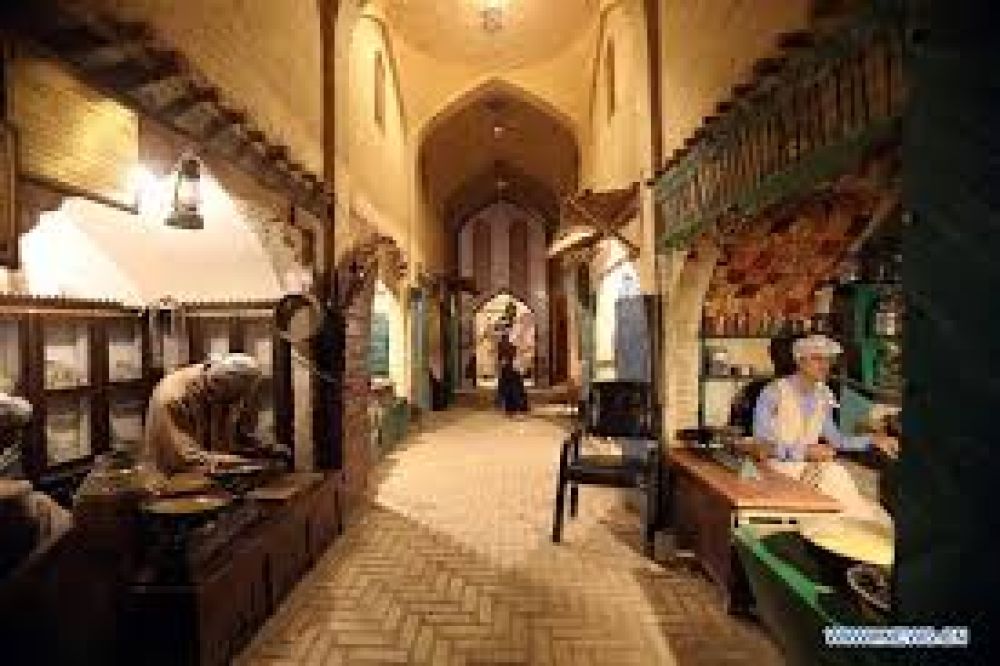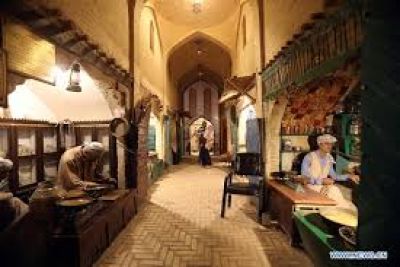

The Baghdadi Museum offers a fascinating Mesopotamian Civilizations Exhibition where visitors can immerse themselves in the rich history of one of the world's oldest civilizations. The exhibition showcases ancient artifacts, tablets with cuneiform script, and relics from the Sumerian, Akkadian, Babylonian, and Assyrian periods. Throughout the exhibition, detailed information is provided about the significance of each artifact and the evolution of Mesopotamian societies. Visitors can learn about the ziggurats, early forms of writing, and the remarkable advancements in mathematics, astronomy, and law that originated from this region. Particularly impressive are the intricate jewelry, pottery, and sculptures that illustrate the high level of craftsmanship achieved thousands of years ago. This educational and cultural journey not only provides insights into the past but also highlights the influence of Mesopotamian civilizations on contemporary culture.
The Islamic Golden Age Exhibit at the Baghdadi Museum is a tribute to the period between the 8th to the 14th centuries during which science, cultural arts, and literature flourished in the Islamic world. Visitors can explore this vibrant era through a collection of manuscripts, scientific instruments, and artworks that reflect the intellectual and cultural achievements of the time. Highlights include detailed astrolabes, beautiful calligraphy, and early medical texts that demonstrate the contributions of Islamic scholars to various fields such as algebra, chemistry, and medicine. The exhibit also provides valuable insights into how these advancements shaped the Renaissance and the modern world. As you walk through the spacious halls, the exhibition offers a clear narrative of how knowledge was shared across cultures, making it a compelling experience for history enthusiasts and those curious about the historical interconnectedness of the human experience.
At the Baghdadi Museum, the Ottoman Era Baghdad exhibit transports visitors back in time to explore the city during its time under Ottoman rule. The collection features a varied display of costumes, coins, household items, and weaponry from the era, highlighting daily life and governance under the Ottomans. This exhibit gives a fascinating glimpse into the blend of Turkish, Persian, and Arab influences that shaped Baghdad's architecture, culture, and society during the Ottoman period. Life-size dioramas and meticulously reconstructed rooms provide an immersive experience that allows you to walk through a Baghdad market or peek into an Ottoman household. The museum has done great work in curating the exhibit, ensuring that visitors receive not only a visual treat but also a deep understanding of the historical context and legacy of the Ottoman rule in Iraq.
The Baghdadi Museum often holds Cultural Heritage Workshops that offer hands-on learning experiences for both adults and children. These workshops provide an opportunity to connect with Iraqi culture through activities such as traditional pottery making, Arabic calligraphy, or even learning about ancient cuneiform writing. The workshops are led by expert artisans and historians, who guide participants through the history and techniques of these ancient crafts. Not only do these workshops offer a creative outlet, but they also serve as an important educational tool to preserve and pass on traditional skills that might otherwise be lost. Participating in a workshop is a unique way to experience the living history of Baghdad and to create a personal connection to the city's rich cultural tapestry.
Guided Historical Tours of the Baghdadi Museum are an excellent way for visitors to gain deeper insights into the history of Baghdad and the significance of the artifacts on display. The museum's knowledgeable guides take visitors on a journey through the different eras of Iraqi history, from ancient Mesopotamia to the modern day. These tours can be particularly enlightening as the guides explain the context behind the museum's most treasured exhibits and the stories of the people who lived in the region throughout the centuries. The tours usually involve a mix of storytelling, answering questions, and providing interesting anecdotes that cannot be found on exhibit labels, making this a highly recommended experience for those looking to enrich their understanding of Iraq's historical legacy.
The Baghdad Through the Ages Exhibit at the Baghdadi Museum offers visitors an elaborate visual story of the city's evolution. This exhibit takes you on a chronological journey, showcasing how Baghdad transformed from a small settlement into one of the largest and most influential cities in the world. It includes detailed maps, architectural models, and interactive displays covering significant periods such as the foundation of Baghdad, the Abbasid era, the Mongol invasion, and the city's modernization in the 20th century. Visitors can appreciate the resilience of Baghdad through wars, changes of rules, and natural disasters, ultimately gaining a profound understanding of the city's strategic and cultural importance throughout history.
The Baghdadi Museum is not only a place for adult visitors but also offers an enriching Children's Education Corner. This area is specifically designed to engage young minds with interactive exhibits and activities that introduce them to Baghdad's history in a fun and accessible way. Kids can participate in puzzles, coloring sheets, and simple quizzes that encourage them to learn about historical events, famous figures, and ancient cultures. The education corner is colorful and lively, making it an inviting space for children to play and discover. By providing a dedicated area for children, the museum fosters a love for history and culture among the younger generation and ensures a family-friendly museum experience.
The Baghdadi Museum regularly conducts Archaeology and Preservation Seminars aimed at professionals, students, and enthusiasts of cultural heritage. These seminars often feature experts in the field who discuss current practices in archaeology, historical preservation, and the latest findings from excavations in Iraq. These sessions serve as an informative platform for discussions on efforts to preserve significant historical sites, challenges faced due to conflict or environmental factors, and strategies for safeguarding Iraq's vast archaeological treasures. Attendees gain valuable knowledge about the country's ongoing efforts to maintain its rich cultural legacy and the global importance of these endeavors.
The Ancient Crafts Exhibition at the Baghdadi Museum gives visitors a detailed look at the traditional crafts and industries that thrived in ancient Mesopotamian cities. Showcasing tools, raw materials, and finished products, the exhibit offers insights into various crafts such as pottery, metallurgy, weaving, and woodworking. Through replicas and original artifacts, one can see the ingenuity and skill involved in creating goods that were essential to the economic and daily life of past civilizations. The exhibition also draws a parallel between past and present by displaying how some of these ancient techniques have survived and evolved into contemporary crafts practiced in Iraq today.
The Iraqi Folklore and Ethnography Exhibit is a cultural gem within the Baghdadi Museum that presents the rich tapestry of Iraq's diverse ethnic groups and their traditions. This exhibit features traditional attire, musical instruments, and household items that paint a picture of the everyday life of various communities within Iraq. Visitors can explore the differences and similarities in customs, folklore, and celebrations among groups such as the Kurds, Arabs, Turkmen, Assyrians, and others. Lifelike dioramas and multimedia presentations offer a vivid and immersive experience, showcasing dance, music, and storytelling as integral parts of Iraqi culture. The exhibit serves as a celebration of the country's diverse cultural heritage and promotes understanding and appreciation among its visitors.
